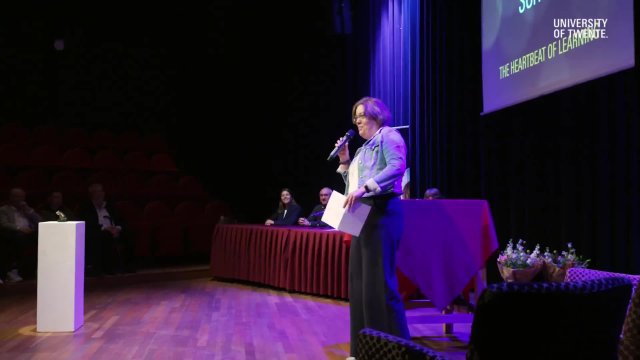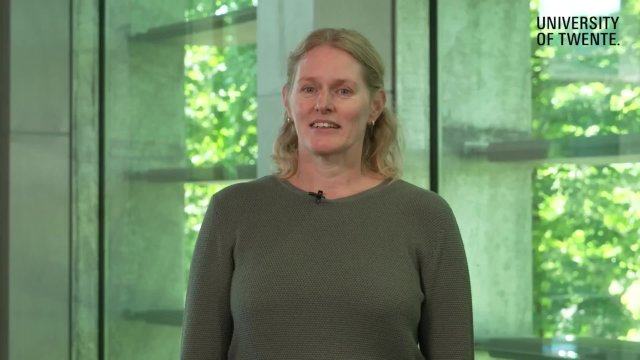Today, we’re speaking with the team behind ReflectBuddy, the winning proposal for the 2025 Brinksma Innovation Grant (BIG). This AI-supported feedback tool will be designed to enhance students’ reflective writing and streamline formative assessment in the Chemical Science & Engineering bachelor’s programme at the University of Twente. The proposal was selected from a strong field of competitors for its promising approach to improving reflective learning at scale.
Let’s begin by getting to know the team behind the project.
Could you briefly introduce yourselves and tell us what roles each of you played in developing the ReflectBuddy proposal?
Leonie: I am the programme director of Chemical Science & Engineering and I set up the essential-skills learning line at CSE. Together with my colleagues, we developed skills workshops and a practical set-up to stimulate the development of our students. Now that the third cohort of CSE works on these essential skills, we need to find a way to ensure that we can still provide feedback to our students in time. That’s where the idea for ReflectBuddy arose.
Linlin: I'm an educational specialist for the Science & Technology Faculty and co-developer of the CSE skills workshops. Together with the team, we shaped the proposal concept, and I focused on the literature review and evidence-informed approach to support and further evaluate our research.
Jéré: I'm a lecturer in the Chemical Science & Engineering programme. Mostly for the Bachelor, but with a few tasks in the Master. I teach some of the essential skills that the students need to reflect on. I supported our other 3 stars with the conceptualisation of the project and plenty of document reviews.
Arnoud: With my colleagues, I develop and teach workshops to support students with their reflections, and give feedback on reflections each quartile. From these experiences, and from my experiments with local language models, I mainly focused on optimizing the feasibility of the proposal and aligning it with our educational practice.
ReflectBuddy proposes AI-assisted feedback on reflective writing. Why did you choose to focus on reflection, rather than other areas where AI could support learning, such as grading lab assignments or adaptive learning in e.g. math or programming?
Linlin/ Leonie: The process of skill development is deeply rooted in reflection, as highlighted in the proposal by Dewey: “We do not learn from experience … we learn from reflecting on experience.” However, mastering reflective writing remains a challenge for students, who often struggle to move beyond surface-level descriptions. Additionally, providing timely, high-quality feedback on student reflections can be demanding for us. So we are interested in exploring the potential of AI to support both students and teachers in this process.
Jéré: What we call AI right now is, above all, a language algorithm. Asking a language algorithm to correct math is like asking a calculator to correct writing; not going to be very productive. The strengths of AI are currently text-based. Maybe in the future (a different type of) AI will be better at math, but that future is not today.
ReflectBuddy integrates AI-generated feedback with teacher refinement. Why did you opt for this hybrid approach, rather than moving toward fully automated feedback?
Linlin: AI may provide a helpful first layer of formative feedback (e.g., identifying descriptive vs. analytical elements), but teachers are essential for interpreting the subtleties of student thinking and providing meaningful and personal guidance. Also, by checking and refining the AI-generated feedback, we make sure it’s accurate, and it helps build trust with students. It also means we’re staying involved in the process, which is important for keeping things fair and respectful.
Arnoud: It also gives us the opportunity for iterative testing. If we notice the same shortcoming in many instances of AI-generated feedback, we can adapt quickly, for example by updating how we prompt the language model.
Jéré: Reflections are, by their nature, very personal. From the students’ perspective, writing such a personal piece and never having a human look at it would probably feel wrong. In addition, AI can simply not be relied on to be factually accurate, and we don't want to give students wrong feedback.
Leonie: As explained by my team members, feedback has a very personal touch. We could try to increase the number of lecturers with access to students’ reflections to help us give feedback, but that means that more people have access to these personal deliberations. We would rather develop ReflectBuddy, in a secure digital environment, to help the four of us to be able to improve the feedback and to share it sooner, making it much more effective.
Several strong proposals were submitted for this year’s BIG grant, each exploring a different angle on educational innovation. What do you think made ReflectBuddy stand out as particularly timely or relevant to the jury?
Linlin: My impression from the video presentations is that the other projects are really interesting. However, since we don’t have access to the full proposals, it’s hard for us to make a fair judgment or comparison.
Jéré: By going only from what we've seen during the ceremony, I think our focus on streamlining and reducing workload for the teachers was particularly relevant at a time like this.
Beyond reflective writing, do you see potential for ReflectBuddy’s approach to be adapted to other types of student work or disciplines, and what kind of training or support would teachers need to effectively implement it in those contexts?
Linlin: We need to develop ReflectBuddy further before we can share more concrete insights.
Jéré: I think it is fair to say that we hope there is potential for ReflectBuddy for other types of assignments and other programmes as well. AI is very nebulous, with many misconceptions about it existing at every level of education. I think a better technical understanding of what it is, what it actually does, and what it can and can't do is essential for incorporating it in teaching.
How do you envision ReflectBuddy contributing to UT’s broader ambitions around educational innovation, especially in the use of AI and skills-based learning?
Linlin: ReflectBuddy is just one component of our broader skills development initiative. The methods, resources, and experience we've built so far for supporting skills development in higher education are highly relevant to other programs as well. So if you’re working on similar topics or facing related challenges, feel free to reach out—we’d be happy to explore how we might collaborate!
Jéré: AI cannot be ignored. Hopefully with this project we can contribute to figuring out how AI can be used for one form of assessment of students’ assignments.
Arnoud: innovations should be tested in a realistic context before wider adoption, and our proposal includes such research. In addition to comparing the impact of AI-assisted feedback versus traditional teacher-provided feedback, we will also be able to report how much time we saved. These are concrete results that can help our colleagues at the UT with deciding on when, where, and how they want to use AI.
It’s inspiring to see how your thoughtful approach is shaping the future of AI-supported education while keeping the human element central. We’re excited to follow the progress of ReflectBuddy and its impact on both students and educators.











